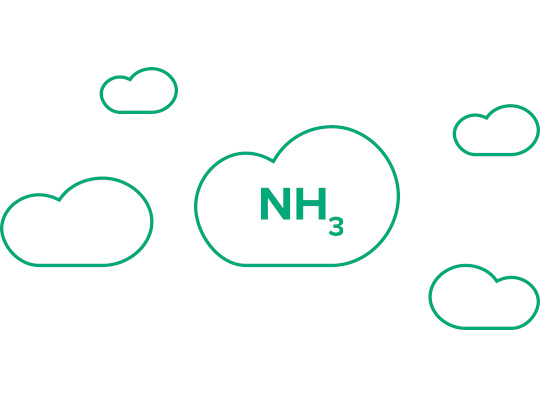Phytogenics on the rise: Mitigate the effects of harmful gases with the power of nature
Emission reduction – a concern to all

We all have already heard about greenhouse gas emissions and how dangerously they can contribute to climate change. Therefore, we need to be aware of the need and urgency to reduce this threat to our planet's unique ecosystem and biodiversity. Our daily choices and actions as individuals have the potential to impact globally.
The global planet's high emissions and concentrations of greenhouse gases (GHGs) are due to human activities. According to Smith et al. (2008), agriculture is the third-largest contributor of greenhouse gas emissions such as carbon dioxide (CO2), ammonia (NH3), or methane (CH4). In this way, as direct players in this sector, we need to take responsibility and act.

What about Ammonia?
Aerial ammonia (NH3) is considered a threat as it affects the immediate surroundings of the emission source. When released into the atmosphere, it is converted to ammonium and ammonium salts, contributing to the acidification of soils and water.
Ammonia emissions from livestock mainly originate from the animal's manure, impacting the indoor animals and workers in the first stage and, subsequently, the atmosphere when released/ventilated from the animals' buildings or generated from the manure storage used as field fertilizer.
Did you know?
Scientifically speaking, ammonia is formed from the breakdown of the urea, which is present in high amounts in the animal's manure. An enzyme called urease is the mediator of this process, and the fecal bacteria is its primary source. When the aerial concentration of ammonia increases indoors, both the animals and workers are affected. The frequent exposure to ammonia causes irritation and damage to the respiratory tract mucosa, increasing the susceptibility to diseases and decreasing animal performance and welfare.
Solutions - Acting locally
In this article published in Poultry World (N°8, 2021) you will discover how poultry and pig producers can limit the damage caused by greenhouses gases emissions, both by acting at the farm level and on their animals' feed.

Manu De Laet
Manu De Laet graduated in 2009 as a bio-engineer at the University of Leuven, Belgium. He has a master’s degree in animal production. After earning valuable experience with phytogenics, Manu started working for Delacon as Global Technical Manager Poultry in September 2018. He is now specialized in nutrition and the effect of phytogenics on digestibility.

Sandra Chamusco
Global Technical Manager Swine at Delacon Sandra Chamusco has a degree in Animal Science at the University of Évora in Portugal and has been working in swine nutrition for more than 20 years. She was a feed formulator and customer consultant, technical responsible and Director of Operations at the Portuguese subsidiary of the French group CCPA. After that she was Director of Swine Nutrition Department at T.N.A. (Portugal). At Delacon,Sandra is responsible for product development and product support, and for the customer technical services for the complete range of Delacon’s swine products on a global level.










